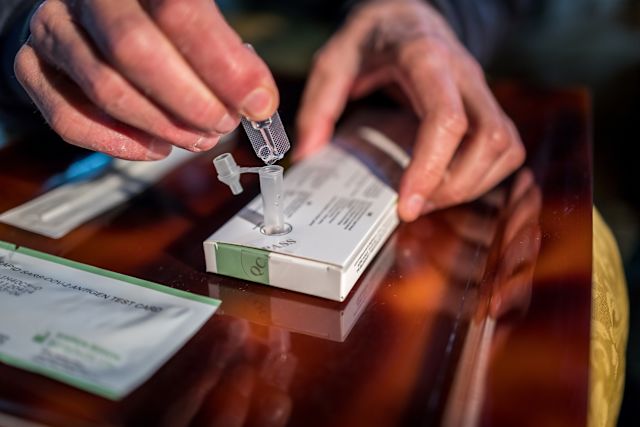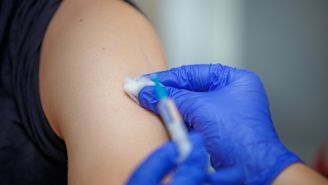Updated on December 16, 2024.
If you have COVID symptoms or know you’ve been exposed to the virus testing for infection can help you make decisions both about your treatment and about protecting those around you.
Viral tests are the most common. There are two main categories of COVID viral tests: diagnostic and antibody. Viral tests for SARS-CoV-2—the virus that causes COVID—look for whether you’re currently infected.
Antibody tests, also called serology tests, look for evidence that you were infected with COVID or were vaccinated against COVID in the recent past. These tests are only used in certain circumstances, usually for tracking public health data.
There are also two types of diagnostic tests: nucleic acid amplification tests (NAATs), including PCR tests, and antigen tests. Both types of tests are usually done by taking a nasal swab from the front or the back parts of your nostrils, or the area at the top of your nose and throat, called the nasopharynx. The results from each diagnostic test type have different levels of reliability.
The ”gold standard:” PCR tests and other NAATs are extremely sensitive and look for ribonucleic acid (RNA) genetic material from the virus. Considered the “gold standard” for COVID-19 tests, according to the Centers for Disease Control and Prevention (CDC), the most common type of NAAT is the polymerase chain reaction or PCR test.
A NAAT or PCR test offers a positive or negative test result. A positive result means a person has COVID. However, a negative test result does not necessarily mean are not infected. Instead, a negative results means the test didn’t detect the viral RNA, but if a person was recently exposed, they could still potentially be infected. It’s usually best in those cases to do a second NAAT or PCR test after a few days.
Most of the time, NAATs are processed in a lab, though they can sometimes be processed at the same place where a healthcare provider (HCP) offers the tests. At-home PCR tests are also available on the market. PCR tests are typically more accurate than antigen tests, but they can take as long as three days to process.
Since NAATs like PCR tests look for viral RNA, and this RNA can linger in the body for as long as 90 days after first testing positive, it’s not a useful test if a person has already been diagnosed with COVID in recent months.
Quicker, but less reliable: Antigen tests, also called at-home tests or rapid tests, are designed to detect fragments of proteins found on or inside the virus, called antigens.
Antigen tests will yield results in about 15-30 minutes. However, they aren’t very accurate until two to five days (or even longer) after you’ve been exposed to COVID. Even then, antigen tests are not as sensitive as NAATs.
If you get a positive antigen test result, you can assume you are currently infected with COVID. But if you get a negative antigen test result, it’s best to take the test again, up to three times total, with each test being 48 hours apart.
Looking for past infections: Unlike diagnostic tests, an antibody test doesn’t tell you if you have the disease right now. Rather, it helps determine if you’ve ever been infected by looking for antibodies that your body would have produced as a response to being exposed to the virus that causes COVID.
Why might this be helpful? There are a few reasons. First, large-scale antibody testing helps epidemiologists—the scientists who track disease outbreaks—estimate the size and spread of a pandemic or illness. This is the most common reason for doing an antibody test.
Second, an antibody test is helpful because it can help HCPs diagnose someone with multisystem inflammatory syndrome (MIS) in children (MIS-C) or adults (MIS-A). Although MIS is rare, it’s a serious condition, and it’s linked to a person having been infected with the SARS-CoV-2 virus.
Rather than testing respiratory specimens collected by swabs, antibody tests check your blood from a finger prick or a blood draw taken by an HCP or at a clinic. Some at-home COVID antibody tests exist as well, which require that you take a sample of your own blood through a finger prick. Regardless of where the test takes place, the sample then needs to be sent to a laboratory for results.
A positive test result means you may have had COVID in the past, but it could also simply be evidence that you’ve had a COVID vaccine in the past. And a negative test result doesn’t necessarily mean you’ve never had COVID.
Some people’s bodies may not make antibodies at a detectable level, or even if they do make antibodies, the levels may lower over time until they’re undetectable. There are also cases when the test results are incorrect or produce a “false negative.”
If you plan to test for COVID
Be sure to only test either through an HCP or with authorized at-home test kits. Fraudulent and unauthorized COVID test kits can often be found online. The FDA provides a list of FDA-approved manufacturers and brand names, which they frequently update. You should also always check the expiration dates of any at-home tests to be sure they haven’t expired.







